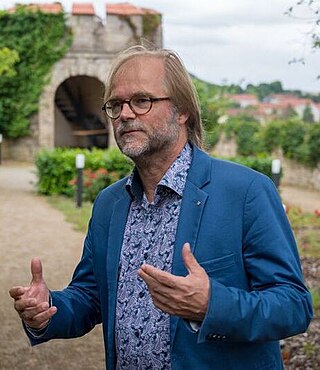The Helmholtz Association of German Research Centres is the largest scientific organisation in Germany. It is a union of 18 scientific-technical and biological-medical research centers. The official mission of the Association is "solving the grand challenges of science, society and industry". Scientists at Helmholtz therefore focus research on complex systems which affect human life and the environment. The namesake of the association is the German physiologist and physicist Hermann von Helmholtz.

The Technische Universität Braunschweig, commonly referred to as TU Braunschweig, is the oldest Technische Universität in Germany. It was founded in 1745 as Collegium Carolinum and is a member of TU9, an incorporated society of the most renowned and largest German institutes of technology. It is commonly ranked among the top universities for engineering in Germany. TU Braunschweig's research profile is very interdisciplinary, but with a focus on aeronautics, vehicle engineering including autonomous driving and electric mobility, manufacturing, life sciences, and metrology. Research is conducted in close collaboration with external organizations such as the German Aerospace Center, Helmholtz Centre for Infection Research, several Fraunhofer Institutes, and Germany's national metrology institute (PTB), among many others. As one of very few research institutions of its type in the world, the university has its own research airport.

The Gottfried Wilhelm Leibniz Prize, in short Leibniz Prize, is awarded by the German Research Foundation to "exceptional scientists and academics for their outstanding achievements in the field of research". Since 1986, up to ten prizes are awarded annually to individuals or research groups working at a research institution in Germany or at a German research institution abroad. It is considered the most important research award in Germany.
BIOBASE is an international bioinformatics company headquartered in Wolfenbüttel, Germany. The company focuses on the generation, maintenance, and licensing of databases in the field of molecular biology, and their related software platforms.
The Dr. Paul Janssen Award for Biomedical Research is given annually by Johnson & Johnson to honor the work of an active scientist in academia, industry or a scientific institute in the field of biomedical research. It was established in 2004 and perpetuates the memory of Paul Janssen, the founder of Janssen Pharmaceutica, a Johnson & Johnson subsidiary.
Rudi Balling is a German geneticist. He is the founding director of the Luxembourg Centre for Systems Biomedicine at the University of Luxembourg (2009-2021) He has served as president of the International Mammalian Genome Society and as co-editor of the Annual Review of Nutrition since 2018. In 2016 Balling received Luxembourg's Ordre de Mérite (Commandeur) from Prime Minister Xavier Bettel.

The National Centre for Disease Control is an institute under the Indian Directorate General of Health Services, Ministry of Health and Family Welfare. It was established in July 1963 for research in epidemiology and control of communicable diseases and to reorganize the activities of the Malaria Institute of India. It has nine branches at Alwar, Bengaluru, Trivandrum, Calicut, Coonoor, Jagdalpur, Patna, Rajahmundry and Varanasi to advise the respective state governments on public health. The headquarters are in Sham Nath Marg, in New Delhi.

Ulrich Reimers is an electrical engineer and is regarded as a pioneer of digital television. The International Electrotechnical Commission (IEC) elected him for its Hall of Fame of most important personalities.
Sharon Jayne Peacock is a British microbiologist who is Professor of Public Health and Microbiology in the Department of Medicine at the University of Cambridge.
The 'German Network for Bioinformatics Infrastructure – de.NBI' is a national, academic and non-profit infrastructure initiated by the Federal Ministry of Education and Research funding 2015-2021. The network provides bioinformatics services to users in life sciences research and biomedicine in Germany and Europe. The partners organize training events, courses and summer schools on tools, standards and compute services provided by de.NBI to assist researchers to more effectively exploit their data. From 2022, the network will be integrated into Forschungszentrum Jülich.
Maria-Regina Kula is an inventor. She was one of the two prize winners of the German Future Prize in 2002. Also in 2002, she was elected a member of the National Academy of Engineering for contributions to the understanding and practice of enzyme-based chemical processes and protein separations.
The Alexander von Humboldt Institute for Internet and Society (HIIG) is a research institution in Berlin. Its stated mission is to research “the development of the internet from a societal perspective with the aim of better understanding the accompanying digitalisation of all areas of life.”
Pan-European Privacy-Preserving Proximity Tracing (PEPP-PT/PEPP) is a full-stack open protocol designed to facilitate digital contact tracing of infected participants. The protocol was developed in the context of the ongoing COVID-19 pandemic. The protocol, like the competing Decentralized Privacy-Preserving Proximity Tracing (DP-3T) protocol, makes use of Bluetooth LE to discover and locally log clients near a user. However, unlike DP-3T, it uses a centralized reporting server to process contact logs and individually notify clients of potential contact with an infected patient. It has been argued that this approaches compromises privacy, but has the benefit of human-in-the-loop checks and health authority verification. While users are not expected to register with their real name, the back-end server processes pseudonymous personal data that would eventually be capable of being reidentified. It has also been put forward that the distinction between centralized/decentralized systems is mostly technical and PEPP-PT is equally able to preserve privacy.

Sandra Ciesek is a German physician and virologist. She is the director of the Institute of Medical Virology at the Universitätsklinikum Frankfurt and professor of medical virology at the Goethe University Frankfurt. Her main areas of research include new forms of therapy for hepatitis C and, more recently, the search for drugs against COVID-19.

Melanie Brinkmann is a German virologist. Until 2019 she was probably best known in connection with her work on the Cytomegalovirus. During 2020 she has emerged as a much consulted expert-pundit for media commentators keen to discuss the COVID-19 pandemic. Brinkmann takes a robust public position in the campaign against pandemic misinformation: she has described the so-called "virus of false information" as "more deadly than the [COVID-19] virus itself".

Kristin Schirmer is a German cell biologist and toxicologist. She is the Head of Department of Environmental Toxicology at the Swiss Federal Institute of Aquatic Science and Technology (Eawag)] and also a professor at the Swiss Federal Institute of Technology in Lausanne (EPFL) and ETH Zurich. Schirmer specializes in Molecular and Cellular Mechanisms of Toxicity, Aquatic Organisms, Chemical Hazard Assessment, Adverse Outcome Pathways, in vitro Alternatives to Animal Testing, Fish Cell Lines and Biomonitoring.
Agnes Asche, also known as Agnes Bertram and Agnes Jünemann, was a German socialist who resisted the Nazis. A street in Hanover is named in her honor.
Gérard Krause is a German epidemiologist. He is currently based at the Helmholtz Centre for Infection Research (HZI) in Braunschweig.

Thomas Hartmann,, was a German pharmaceutical biologist and ecologist who was professor in the Department of Pharmaceutical Biology at the Technische Universität Braunschweig. His research focused on the biosynthesis, intracellular transport, and action of quinolizidine and pyrrolizidine alkaloids in fungi and plants and the sequestration of these secondary natural products by insects.

Holger Becker is a German businessman and politician of the Social Democratic Party (SPD) who has been serving as a member of the Bundestag since the 2021 German federal election, representing the constituency of Jena – Sömmerda – Weimarer Land I.









